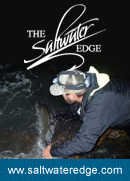Charlie Witek’s article about Gamefish in the most recent issue of SJ was filled with facts, but one tidbit that I felt was almost lost in the margins was this notion that the fate of the fish – and maybe even our own fate – might one day ride with politicians and others of influence who don’t fish and couldn’t tell a striped bass from a flounder.
It brought me back to a discussion I had years ago with Richard Brodsky, a New York State Assemblyman who served from 1993 to 2002 as Chairman of the New York Committee on Environmental Conservation. If you had a battle in fisheries management in New York during this time, and had a bill, chances are you needed to convince the likes of people like him in order for the bill to have a fighting chance. The conversation took place around 2000, a cocktail party meet and greet type setting. He asked me what I fished for. “Striped Bass, mostly surfcasting” I said. A few minutes later our conversation turned to fly fishing, and I might have mentioned Montauk. Then it hit him and his eyes grew wide, “You mean you fly fish… in salt water?…From the beach? Oh my god I didn’t think there was such a thing! And you actually can catch fish this way?”
I eventually directed the conversation to whiting, a winter species that was once a pillar of the local recreational fishing 30 years ago until local runs were wiped off the map. “What do you mean collapse?” he continued. “ I saw smoked whiting in the market by me, just last week.”
Now I am not suggesting he was totally clueless, and yes he did do some fishing, but it reinforced the idea that we tend to see things from our own highly selective lens. Right or wrong, this can be so different from the way the rest of the world probably sees it – even to those who have significant influence on how things might turn out. Just so often, I get subtle reminders.
To further corrupt my thinking, I recently finished a book entitled “Coming Apart,” by Charles Murray. With Occupy Wall Street all over mainstream media, and recurring news reports of greater disparity in living standards among the classes in the US, Murray’s detailed academic description of how the rich are only getting richer and the poor only poorer caught my attention. So it landed on my must-read list. Ok, call me weird.
Anyway, Murray describes a post-1960’s America, with a highly educated and well-to-do elite class splintering off and doing more of their living in communities (that are becoming more and more) separated from “blue-collar” or mainstream communities. He gives these communities – the white collar and blue collar – fictitious names. Wouldn’t you know it; Murray calls the working class neighborhood “Fishtown.” If that were not enough, Murray, an MIT graduate himself, then offers a questionnaire to gauge whether the reader (he jabs that anyone reading his book is not mainstream) is really in touch with mainstream America: In the questionnaire, you give yourself points if you’ve ever seen the inside of a factory, or if you’ve gone fishing, among other things.
You can laugh, I did.
But Murray’s suggestion is that many of the “elite,” whom he proves now hold key decision-making positions in our society, have never done much factory work, or gone fishing. Hmm, hear that George Bush? Now, that doesn’t mean we all need to camp out at a Zuccotti Park, or start listening to Bruce Springsteen’s new album “Wrecking Ball” (same theme).
All kidding aside, if we one day think we are going to get Gamefish, or have other high aspirations for conservation and access, I’d say there’s a whole lot of soul searching and general education that needs to get done, before signing chain letters and hoping for the best.
We still need to face up to the fact that many Americans only see a real fish when they visit the display case of a supermarket.
 [issuu width=420 height=162 shareMenuEnabled=false showHtmlLink=false backgroundColor=%23222222 documentId=120311004957-aa2402a5155442c7ab27bce503b9ff57 name=surfcasters_journal_issue_12 username=surfcasters_journal tag=fishing unit=px id=38ba2ca8-adb8-1562-d125-ebdeb78a3d97 v=2]












Thought provoking piece. Thanks.
↓Great read and definitely makes you think. It never ceases to amaze me. More fishermen will show up on the banks of the canal on any given Saturday to catch a skunk. But ask them to show up for a meeting to protect the species most will nod and say yes but most will not show.
↓If you get a chance read “Stealing the National Parks: The Destruction of Concessions and Park Access” by Don Hummel. A very interesting read to about mismanagement by the higher-ups or “elite” Shows just how long the fight has been going on.
↓A view from the Ivory Towers…sad, but true. Hey look on the bright side, without those types we wouldn’t have such famous quotes such as “Let them eat cake” 🙂
History has an answer & it’s called a revolution. However, who knows what follows after & it’s usually pretty unpleasant for awhile.
↓Jefferson I believe said every generation needs a revolution. We might be due.
↓Overdue
↓zeno & crew your magazine has really come a long way from inception. issue 11 is great. the articles are very interesting & well written. dave anderson on plugs priceless; since dave himself makes a great plug. can we get some more black t shirts for friends? bam!
↓Don’t you guys ever get off that hate Bush thing…lol
↓Hi Z
↓I agree with the overall sentiment but George W. may not be the best example. At least he and his dad fish, and George W. did give the Striper gamefish status in the EEZ.Our present Commander[community organizer] In Chief may be a better example. Both parties are full of professional life long politicians who don’t have a clue.Our founding fathers never intended us to have a seperate ruling class that is almost impossible to get rid of.Term limits is the answer.”Politicians and diapers need to be changed often, and for the same reason”. Sorry for the rant but I needed to vent.
Thanks for putting up with it. Now when do the schoolies get to the West Wall???
George W and his dad fish, and the article clearly meant to point out that this was indeed an exception. But you’d have to agree there are not a lot of Yale grads from money, on the fast track to some high-powered career, who grow up knowing what factory life is, and/or knowing what a day on the water is all about.
***
Not to get off on a tangent, but Morrow suggests the disparity of living standards has as much to do with changes over the last half century in terms of work/life habits of those less well off. For example, he makes a case that children raised by a single parent are -simply put- less likely statitically to fare as well as the next kid who was raised by an intact family. So when the NY Times reports recently a historical new trend, that now >50% of less educated women are having/raising children on their own, it makes scientists like Morrow sound like a genius. We can call for a revolution, and blame THE MAN, but how are we going to fix that?
Sorry, back to fishing…
↓the governor of ct wants to take the $166,000 set aside for the purchase of phesants ( money that the sportsmen paid in 2011) and cancel the program for 2012. well if there are no phesants stocked in 2012 how many sportsmen will purchase the tags? how about zero.. he just doesn’t get it
↓Necker1
↓Pay attention…school is in session
Its not my post but our columnist John Papciak
carry on…
Just to second John’s comments…
My article was intended to investigate the issues surrounding the “gamefish” debate, and not create a blueprint for getting there. However, whether we’re talking about setting the season for fluke or outlawing the sale of stripers, never forget the fact that fisheries management is primarily a political effort. While it’s true that it has a scientific base–and I have come to know a lot of very bright, very skilled, very experienced and very frustrated fisheries scientists over the past couple of decades–in the end, all the scientists can do is recommend actions. They can’t implement them. That is left for the politicians.
And the sad fact is that, these days, the politicians don’t hear much from anglers. They hear from commercial fishermen, from the for-hire fleet and from the tackle shops, who all have economic interests in the fishery. But they don’t hear from the general public, who are the actual owners of the fishery. And, despite the cynicism that comes so easily, the truth is that politicians do want you to be a part of the process, but they can’t count the votes and opinions of those who don’t show up. Once again, I can only urge everyone who cares about this stuff to be active.
Let’s try this: We all know that bass eat bunker, and that you catch more bass when there is bait around. You may or may not know that the bunker population is at historic lows, with spawning stock biomass around 8% of that of an unfished stock. For more than a dozen years, CCA and other groups have been working to improve menhaden management. First, we had to change the way the species was managed at ASMFC; essentially, that meant getting the fox out of the henhouse and the representatives of the reduction fleet off the management board. We did that about 10 years ago. Then we took a series of small steps, incrementally improving the management system. Finally, last November, ASMFC voted to adopt a new, biologically sound fishing target and threshold. Now, they’re developing a new Amendment to the management plan, which will put in measures to achieve those reference points.
On Tuesday, March 27, at 7:00, the ASMFC will be holding a hearing on the amendment at the DEC offices on Belle Meade Road in East Setauket. If you want our stripers to eat well, it would be a good idea to show up and support the plan.
↓i thought that bush 2 was for conservation?
↓Both Bushes were active anglers and supporters of fisheries conservation. Bush II, along with signing the executive order that prohibited the commercial harvest of striped bass and red drum in the EEZ, made it one of the goals of his last administration to end the overfishing of federally-managed species and restore them to optimum levels of abundance.
He wasn’t too good when it came to other conservation issues, but when it came to salt water fish, Bush II was probably the best that we’ve ever had.
↓thanks charles
↓